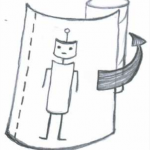The Hour of Code and all things educational
There’s been a media brouhaha about coding recently**. The Hour of Code puts this into perspective—it’s all about demystifying what coding is, having a play and realising that it isn’t as arcane or difficult as you thought. Of course at one end of the scale, computer science can be as challenging as it gets. But at the other end you can dip your toe in and start to appreciate that Computing as a subject, and programming specifically, can be creative, purposeful and lots of fun.


And if you’d like to try some Raspberry Pi based activities as part of the Hour of Code week here’s a small taster of the teaching and learning materials that we’re writing and collating for our new website (launching end of March). It includes Sonic Pi, Minecraft Pi, Google Coder and, of course, a screaming jelly baby. Enjoy :)


Carrie Anne and Ben from the Raspberry Pi Education Team are telling me to shut up now as they would like to say stuff. So I’ll leave them to it…
Carrie Anne
During the Jamboree at the EICE conference last week, Ben and I spoke about our work at the foundation on the new website and our vision to produce educational Raspberry Pi resources for teachers and learners. Since this talk we have been inundated with offers of support and want to know more. (This is the best community!)
There are many ways in which you can help us:
- Firstly by taking an active role in the education section of our forum. If you have created a great resource, ran a good workshop session, or created a video tutorial, then post it here. Let’s get this section of the community talking.
- Submit your resources to be used on the new website (leave a comment below to get in touch, and we’ll email you). In the not too distant future we would like to create a form for you to submit your resources to be considered for use. We are writing our resources in markdown, so if you already have stuff on GitHub for example it would be easy for us to point to them or fork them for reuse. You may wish to write up your mega cool resources in a similar way.
- We need testers! Before many of our resources go live, especially those intended for the classroom, we would like them to get feedback from our audience and suggestions. We’d also like to make sure they work! Again, leave a comment if you’d like to help.
- Run a Jam in your area. Why not start a Jam or attend a jam in your area to support young people and invite teachers from local schools to attend?
The Hour of Code resources are a taster of what is to come on the website, and we would be interested in hearing your feedback on them. Please test, check, and give us productive pointers.
Ben
Introducing Raspberry Pi Learning on GitHub! We set up a new GitHub organisation to host our learning resources and educational material. Each resource will have its own repository here, and we’ll be using git to manage changes in the team and from the community. Within hours of these being live (even before we announced it) we had our first pull request from Alex Eames – who fixed some typos and cleaned up some Python GPIO code with better practices (thanks, Alex!).
Our resources are written in Markdown, which is really easy to use and to manage. The links in the Hour of Code page show the markdown rendered by GitHub, and when we launch our new website they will be rendered nicely in the site template, which work beautifully on screen. We’ll also provide printer-friendly alternatives. (We’re not showing you what things will look like in the new site template yet because we don’t want to spoil the surprise!)
If you’re writing any resources or documentation (or anything, really) I’d recommend you look at using Markdown – you can pick it up quite quickly with this GitHub Flavoured Markdown guide. If you spot a mistake or have an improvement you can open an issue to alert us of it, or even fork the repository, fix it and open a pull request, which we can evaluate and merge if suitable.
—
[**Short version: ‘coding’ is actually just a small part of computing, which is a fantastically rich, exciting, creative, challenging, cross-curricular, all-around-us-in-everyday-life, useful and powerful toolkit for thinking, problem solving and making stuff. Phew.]





26 comments
Jonathan Morris
How would one go about setting up a RPi Jam. The pi, in my corner of America, is popular according to RasTrack, but no one has really heard of it. :(
Ben Nuttall
Go for it! There’s no golden rule or manifesto you need to follow – just find a space and do whatever suits your attendees. It could be anything from a table in a library to a university building – some organise talks, others just let people hack. Some are for families and kids and run workshops, others are attended by developers and makers who just get on with their projects.
If you want some inspiration or some FAQs answered and discussed you could watch this video from this weekend’s Jamboree in Manchester – featuring the organisers of the Cambridge, Manchester Jams – and the Pi meetup at CERN on the French/Swiss border:
https://www.youtube.com/watch?v=8dflJDB-_eo
Good luck!
Michael Horne
Hi Jonathan. It’s great that you want to start a Jam. I was on the panel that Ben gave the link for. If you want some more advice I’m always happy to help – mike@recantha.co.uk
—
Mike
RaspberryPiIvBeginners
Well you guys know my bank of video tutorials.
tzj
I’m still wating for someone to work with in setting up a jam in barnsley…
Ben Nuttall
Start small? Try booking a small space and advertise it locally – see what happens. Most likely an attendee will say they’d be interested in helping – more likely than getting a volunteer come up online.
I ran 16 Raspberry Jams in Manchester (by myself) for 30-80 people. People turn up and help out – it’s part of the culture, part of their nature.
tzj
In your opinion would a pub function room be suitable?
Raspberry Pi Staff liz
Absolutely – you should check out the Pi and Pint guys in London for a very similar model. (I believe there’s also a group out there called Raspberry Pint, with a similar modus operandi.)
Monkeymademe
Hey guys I would like to offer my help as a Tester. I work in QA so its nothing totally new to me to have structured tests. Also if its educational material I have a 5 almost 6 year old willing and waiting to learn ;-)
Ben Nuttall
Great, thanks.
meltwater
Excellent to see these things available, great start to building up the resources.
I’m sure we can identify suitable MagPi articles to be included.
Plus (when time is available) the lessons which are on PiHardware.com.
Hopefully teachers will be willing to provide feedback on the resources as they are made available, so that the community can ensure they are producing things which are useful!
If you need some specific information, then do ask, as I am sure there will be plenty who will happily help.
The Raspberry Pi Guy
But… What is code?! ;-)
Feel free to use any of my material as well!
The Raspberry Pi Guy
Ben Nuttall
We just don’t know.
Thanks, Matt.
The Raspberry Pi Guy
;-)
Drat – wrong email address!
Matt
Stewart Watkiss
Let me know if you need a tester. I have access to children to test with as well (my own are 6 and 8 years old, but also being doing some STEM activities with local schools).
I have also created / are working on some projects of my own:
The “infamous” Bee project (reed switches)
Talking / singing reindeer (PIR detection)
and currently writing up a robot vehicle – documentation is mainly on the aspects of setting up the Raspberry Pi and how the electronics work. The programming in python is a “starting point” with suggestions for ways to improve it.
+ a few other projects that are a bit more advanced and some way off being complete
I’ll also add a post to the forum on “Teaching Scratch to primary school teachers” that I have done for teachers of a local school.
Carrie Anne
Thanks for the great feedback and help everyone. We will get back to you on your offers in time (ha! too late you volunteered.)
Ben Shamsian
We will be setting up a Raspberry Jams in San Diego, CA. I will send out the location and the time next month
Zachary Igielman
I’d love to review/test resources! I’ll be able to give a students perspective (being a student ya know). In the future, I plan on document-ing and tutorial-ing my projects so I’ll link that stuff but in the meantime, send me anything and I’ll give feedback!
Tobias Huebner
Hi,
I`m a teacher from germany and I started working with the Raspberry Pi about a year ago. I publish all the materials I make on my blog medienistik.de. You can download them for free and edit them. But beware – they`re in german :)
There`s a RPi Jam in Trier/Germany called “Pi and More”. The next one takes place June 28th. Last year I gave a talk about using the Pi in schools and this time I`ll organize a workshop especialy for educators, but everybody`s welcome!
Needless to say that I`d also test-drive any new materials you make.
I`d also like to encourage teachers to use the Pi – especially here in germany – because I think it`s the most versatile, creative and affordable tool that I`ve ever used in school. Well, except for paper maybe…
I don`t write a lot of comments here, although I read this blog everyday. So I want to take the opportunity to thank all of you who are part of the Pi-Community. One of the main reasons why working with the Pi is so much fun is that there are so many friendly and generous people out there spending their time showing others how things work and how to create awesome stuff!
andycrofts
Tester available!
I’ve 2x Pi’s, 30-odd years of electronic/telecomm. experience.
Previous job as a global trainer for Nokia Networks, and am an annoying stickler for accuracy!
I also have the benefit of being unemployed, and as I’m 57, greying, but still mentally fit (creating PiLab – a pi-in-a-box to toss forgotten for a year or two in a forest, and using 3G to send pictures to the above website (dammit! PSU failed earlier today – offline, but it is only a ‘proof-of-concept sandbox currently) and environmental data to carriots, I need to learn myself. Solar? Yep, need that – thanks, Julian Ilett (256.couk).
I can’t program myself out of a wet paper bag, but I reckon that’s exactly what you want!
Count me in.
Ann
I’m more than happy to test classroom resources. I’m currently training teachers in programming, Scratch and using the Raspberry Pi.
Jim Manley
I’ve run Jams at the Computer History Museum in Mountain View, CA, (home of Google, Microsoft’s Silicon Valley campus, etc.) and the Monterey Bay area for about 18 months (since receiving my first Pi). Find a public space such as a library, museum, adult school, senior center, or anywhere else that’s already paid for by the taxpayers or public-minded non-profit organizations who are always looking for something new to bring in new potential members and contributors.
Even after two years, few in the general public have actually seen a Pi in operation, let alone gotten to try one out, although many have heard good things about it, so there is already built-in buzz and curiosity. Ask Rotary Club, Elks, Parent-Teacher Associations, Boy/Girl/Pioneer Scouts, 4-H, etc., for advice on where to meet and how to get sponsorship, emphasizing the education aspects of what you want to do.
Libraries are especially nice venues as they have plenty of tables/desks with keyboards and screens available with their computers, although don’t disconnect anything without first meeting with the admin and IT folks to show them exactly what you propose to do as far in advance as possible. If you’re polite, demonstrate expertise, etc., they will not only likely allow, but actively assist you – serving the public in access to info of all kinds is their job and they love to do it! If need be, start out by bringing your own equipment and show them that you can be responsible and neat. Once they see what you’re doing, they’re probably going to ask whether you can come every week or even day to teach kids of all ages (including seniors) how to use this wonderful new technology that has capabilities that can’t be accommodated easily on public systems that don’t allow installation or downloading of any executable software.
Schools would love for someone to establish an ongoing event that would serve as a local version of something like a Code Club, Coder Dojo, or Jam. They don’t have the expertise and have given up looking for it, and their IT departments have been doing their damnedest to lock down and keep anyone from doing anything interesting beyond white-listed-site web surfing with any of the computers they administer because that would require work on their part.
Alan Donohue, the Godfather of Jams, has demonstrated that people are willing to pay to attend well-organized and run events, and/or that sponsorship by commercial/non-profit entities can make available world-class venues in the larger cities. Notify your local TV, radio, and other news media that your Jam is coming to town and if you meet with them to demonstrate the Pi with as wide a variety of software and peripherals/accessories as possible, they will see something that they want to publicize, I guarantee you. Most media outlets offer free publicity to public events where they fill empty ad slots with public service announcements (they even get to write it off as a charitable deduction), and many have scheduled event calendars as part of their standard news programming. Invite them to cover the Jams and I guarantee you that they will be delighted to fill airtime/media space with happy faces encountering Scratch and friends for the first time.
Remember, if there’s no Jam in your area, only YOU can prevent a Jam drought. Get the word around about what you’re trying to do and you’ll be amazed what kind of help can materialize from the woodwork, from knowledgeable geeks to people with venues they’re looking to fill, even if it winds up being a tax writeoff – they can’t write off an empty space not serving the public. To paraphrase the Nike motto, “Just Jam It!”
Well, as usual, this post is turning into a book, so I guess I should get together with Alan and finish it off in at least e-book form, if not also a tree-pulp edition! :lol:
Jim Manley
Rats – forgot to put the slash in the trailing tag after the words ” … they love to do it!” and the trailing tag. If a mod can help a brothuh out so he don’ look like such a fool … :lol:
Raspberry Pi Staff liz
Your wish is my command – but I’m leaving your dangling tag in *this* post because I think it’s hilarious! :D
AndrewS
Heheh, I misread “prevent a Jam drought” as “prevent a Jam doughnut” ;-)
ColinD
Carrie Anne you mention you need Testers… just so happens that software testing is my day job (and formally hardware too). Drop me a message, happy to help.